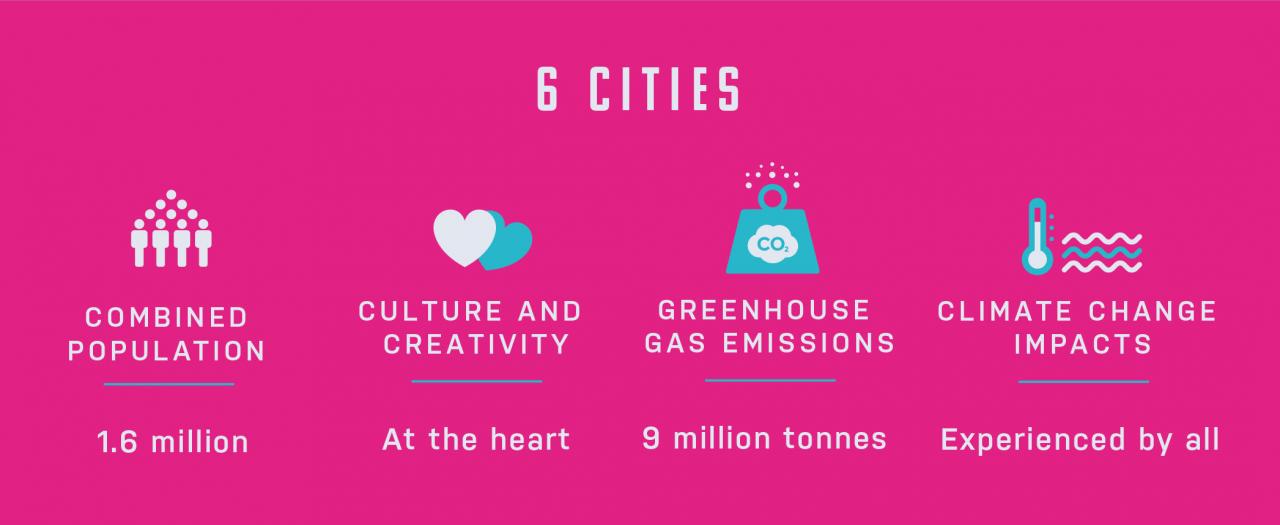
“The climate and ecological crisis is a systemic issue, rooted in global economic, social, cultural and value systems locking in unsustainable consumption, inequality and a disconnection from nature.
Policies, technology and investment alone will not be enough to address it - to protect what we love, to survive and to thrive. We need hearts, minds and a shift in our cultural values”
The arts and culture sector is uniquely placed to bridge the gap between what we know and feel, to support the kind of values’ shift we need in order to address the climate and ecological crisis, and to demonstrate and mobilise climate and environmental action. This is particularly relevant when it comes to cities, on the front line of climate change, and where art and culture connect citizens to the cultures which define them.
This was recognised when the Manchester Climate Change Agency started to work with the city’s arts and culture sector which resulted in the establishment of Manchester Arts and Sustainability Team – out of which the C-Change good practice was born. The C-Change project has spent two years understanding how this best practice can be transferred across 6 cities with the same goal.
The C-Change model is built on 4 key strands – collaboration, support, policy and engagement – which combine to frame and drive sector action;
The city’s arts and culture sector connect on climate.
The city supports the sector to act on climate.
On a policy level, the city introduces measures to drive sector climate action and, in some cases, the sector is directly involved in city climate change strategy development.
And the arts and culture engage people in cities on climate.
Climate action understanding and knowledge was identified by the culture sector in Manchester as something they needed support on. In response to this, a capacity building programme was developed covering a range of activities from training to sustainability guides. C-Change had delivered carbon literacy training to the network, including city culture representatives, as part of the Study Visit to Manchester in October 2019. During the pandemic, this training was digitally adapted for remote delivery and will remain available for delivery in this format, not only to arts and culture sector staff, but also to their volunteers. A learning module was developed to take people beyond carbon literacy training to help the sector respond to the climate and ecological crisis. This module covers climate change policy to practical action that can be adopted by people. Other practical action delivered as part of C-Change included work with the Cultural Leaders in the city to help to support them to be leaders on the topic, and work to develop a ‘Reusable Cups at Events Guide’ as part of MCC’s sustainability guides pack.
The final C-Change results are now live on https://www.g-mast.org/c-change and include;
- The C-change model and results
- Exploring the cities and their transfer stories
- What the project has learnt
- What the project has achieved
“It has been an absolute privilege to work with and support the C-Change network, to see five new cities build on the Manchester Arts Sustainability Team model, shape and make it their own and also to see how C-Change has strengthened collaboration between city and sector in Manchester. The network was built on connection and trust with a wonderful group of committed people from six cities, which has resulted in cultural collaboration, action and engagement on climate. I have learnt a lot from them all.”
Claire Buckley, URBACT Lead Expert and Programme Lead, Julie's Bicycle
“It has been a joy to see the successful transfer of the Manchester good practice in our partner cities and to see how they have adapted and reused it to influence climate action in their cities. I have been so impressed by our city partners and grateful for the support from our lead expert Claire Buckley and topic expert Simon Curtis. It has been a great pleasure to work alongside them.”
Grainne Bradley, Project Co-ordinator, Manchester City Council
